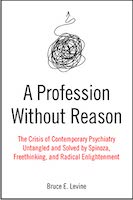Book Reviews: Lincoln’s Melancholy; Against Depression
If we declare depression to be nothing but a disease, as Peter Kramer
demands in Against Depression, then billions of dollars will continue to
pour into biotech research and treatment and we will continue to ignore
the societal and cultural causes of depression. If instead, we see
strengths in those with depressive temperaments, as does Joshua Wolf
Shenk in Lincoln’s Melancholy, then we become uneasy about handing over
our despair to profit-hungry biotech corporations.
STAR*D Wars
The Corruption of the National Institute of Mental Health and the Failure of Antidepressants
On March 23, 2006, STAR*D results were major news, front page in the Washington Post. STAR*D, the official acronym for Sequenced Treatment Alternatives to Relieve Depression, was a two-step antidepressant treatment study funded by the National Institute of Mental Health (NIMH), costing U.S. taxpayers $35 million. The NIMH proclaimed that STAR*D showed that 50 percent of people with depression can get better within the two treatment steps using this approach; and STAR*D researchers declared, A 50 percent remission rate is extraordinarily good, given the nature of these disorders. The Associated Press and much of the media simply echoed the enthusiasm of NIMH and STAR*D researchers.
U.S. Mental Illness Epidemic
By 2003 in the U.S., 1 in 50 had been classified as disabled mentally ill, an increase from the 1987 rate of 1 in 75 (based on Social Security Administration payments for the mentally ill). This was reported in the journal Ethical Human Psychology and Psychiatry in 2005 by science writer Robert Whitaker who also noted that 1 in 300 were considered disabled mentally ill in 1955, an increase from 1 in 500 in 1903 (1955 and 1903 statistics based on U.S. mental illness hospitalizations).
Behind the Paxil Scandals
In June 2004 New York State Attorney General Eliot Spitzer brought suit against Glaxo, alleging that it had engaged in repeated and persistent fraud with respect to Paxil (a $3.1 billion grossing drug in 2003). Spitzer had evidence that the giant pharmaceutical corporation Glaxo had suppressed the results of studies on children and adolescents that showed Paxil to be ineffective and to increase the risk of suicidal thinking and behavior. When he first announced the suit, Spitzer stated, “By concealing critically important scientific studies on Paxil, GlaxoSmithKline impaired doctors’ ability to make the appropriate prescribing decision for their patients and may have jeopardized their health and safety.” Spitzer had an internal Glaxo memo from 1998 stating that the company intended to “manage the dissemination of the data in order to minimize any potential negative commercial impact.”
Indian Problems: Shrinks, Lies, and Justice
There is no doubt that alcohol abuse and other self-destructive behaviors are major problems among modern Indians. Is this a medical issue that will be solved by psychiatrists, psychologists, and social workers? Or is this a political issue that can be solved only by ending the oppression of Indians? There are of course many healthy […]
Pills often no help in battling depression
“UC studies drug for depressed women” (June 28) reported that a new antidepressant affecting the neurotransmitters serotonin and norepinephrine is being investigated. The article included a sidebar informing women how to participate in the study. But it excluded important facts that might give a woman pause before enlisting.
Eli Lilly, Zyprexa, & the Bush Family
The Diseasing of our Malaise
More than one journalist has uncovered corrupt connections between the Bush Family, psychiatry, and Eli Lilly & Company, the giant pharmaceutical corporation. While previous Lillygates have been more colorful, Lilly’s soaking state Medicaid programs with Zyprexa—its blockbuster, antipsychotic drug—may pack the greatest financial wallop. Worldwide in 2003, Zyprexa grossed $4.28 billion, accounting for slightly more than one-third of Lilly’s total sales. In the United States in 2003, Zyprexa grossed $2.63 billion, 70 percent of that attributable to government agencies, mostly Medicaid.
Psychiatric Medications, Illicit Drugs, & Alcohol
The article titled “Pay Attention: Ritalin Acts Much Like Cocaine” was published in August 2001 in the Journal of the American Medical Association (JAMA). It’s not likely you’ve heard about it. Pharmaceutical companies do their best to ensure we hear something altogether different, something like this: “Psychiatric medication—just like insulin—restores the chemical imbalances that cause mental illness.” To get that message across, they spend billions of dollars on TV commercials. They also spend billions of dollars on drug representative visits to doctors’ offices, advertisements in medical journals, and seminars for doctors. Pharmaceutical companies even help fund the American Psychiatric Association, the National Alliance for the Mentally Ill, and other mental health institutions. Nearly one in four American adults are taking prescription psychotropic drugs, while America’s “war on drugs” has led to more people imprisoned in the United States (in total and per capita) than any other industrialized nation.




